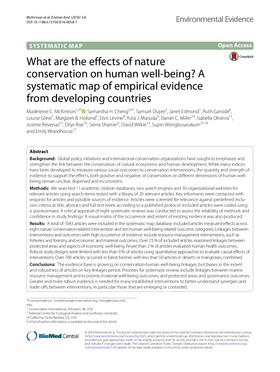What are the effects of nature conservation on human wellbeing? A systematic map of empirical evidence from developing countries

Global policy initiatives and international conservation organisations have sought to emphasise and strengthen the link between the conservation of natural ecosystems and human development. While many indices have been developed to measure various social outcomes to conservation interventions, the quantity and strength of evidence to support the effects, both positive and negative, of conservation on different dimensions of human well-being, remain unclear, dispersed and inconsistent.
We searched 11 academic citation databases, two search engines and 30 organisational websites for relevant articles using search terms tested with a library of 20 relevant articles. Key informants were contacted with requests for articles and possible sources of evidence. Articles were screened for relevance against predefined inclusion criteria at title, abstract and full text levels according to a published protocol. Included articles were coded using a questionnaire. A critical appraisal of eight systematic reviews was conducted to assess the reliability of methods and confidence in study findings.
Included articles measured effects across eight nature conservation-related intervention and ten human wellbeing related outcome categories. Linkages between interventions and outcomes with high occurrence of evidence include resource management interventions, such as fisheries and forestry, and economic and material outcomes.
The evidence base is growing on conservation-human wellbeing linkages, but biases in the extent and robustness of articles on key linkages persist. Priorities for systematic review, include linkages between marine resource management and economic/material well-being outcomes; and protected areas and governance outcomes. Greater and more robust evidence is needed for many established interventions to better understand synergies and trade-offs between interventions, in particular those that are emerging or contested.